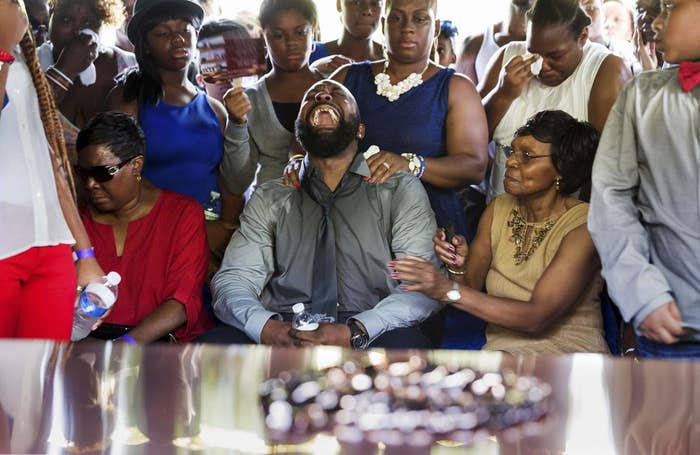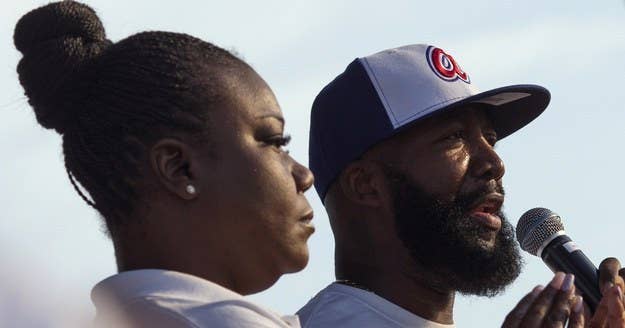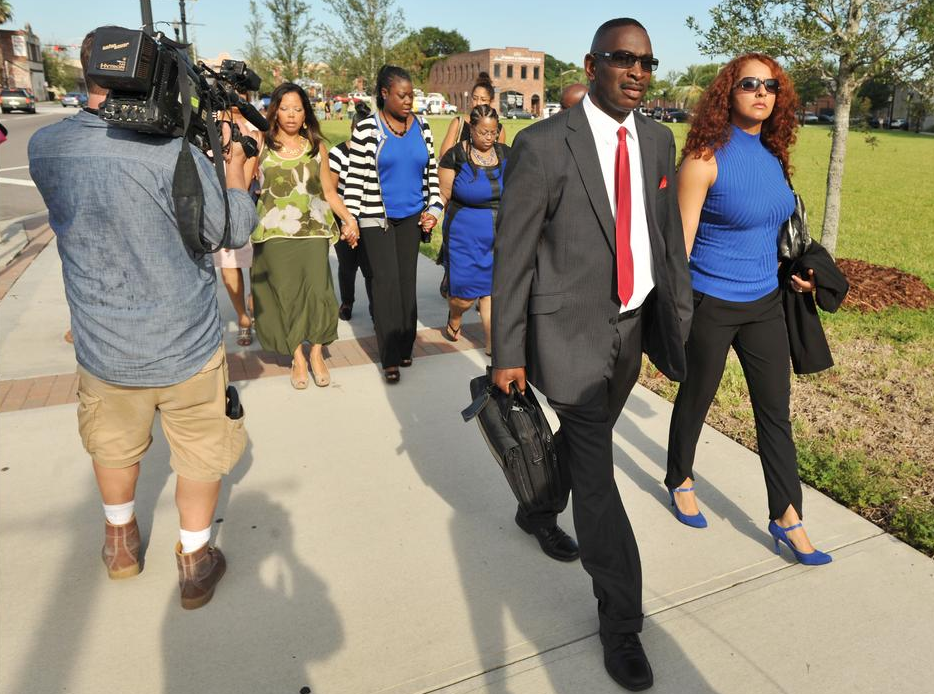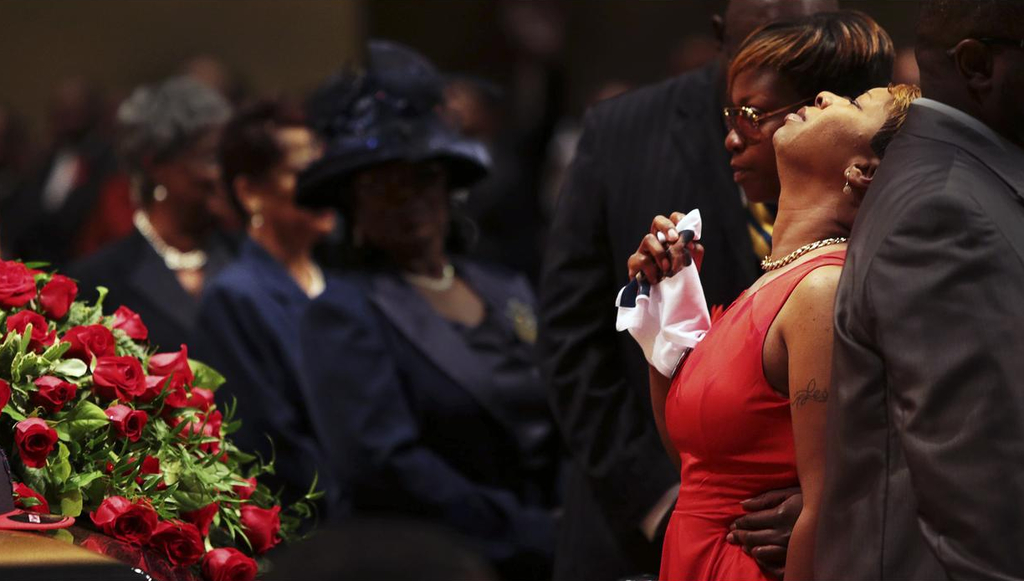
It's been over a month since 18-year-old Michael Brown Jr. was shot and killed in Ferguson, Missouri, by police officer Darren Wilson, and the Brown family have questions but few answers. Weeks ago, their attorneys filed a request for more information on Wilson's police career, but they're still waiting for it. A grand jury has convened in St. Louis County, but won't decide whether to indict Wilson for at least another month or longer.
The slow movement of the case has the family questioning whether the public really gets what happened. "People really don't understand that she lost her son," Eric Davis said of his cousin, Lesley McSpadden, Brown's mother.
Black families thrust into the media spotlight by the death of a loved one are forced to relive their loss over and over, both in court and in the public eye. They have few places to turn for solace and support, other than one another.
"There hasn't been any real improvement [in Lesley]," said Davis, who visits McSpadden either at her home or her mother's house every day after work. "We are still looking for answers. We don't have answers as to anything about the officer, which is really really preventing us from moving on."
The Brown family is not alone. Tracy Martin's son Trayvon was gunned down by a man claiming self-defense in 2012, in an episode that captivated the country and cleaved it along racial lines. Among some supporters of George Zimmerman, the Florida man who shot the younger Martin but was acquitted of murder, school troubles and adolescent drug use became retroactive justifications for Trayvon Martin's death.
Tracy Martin has become the unofficial leader of an exclusive club no parent would ever want to join: the black families who have to find a way to recover from their loss even as they navigate a complex legal system and watch their loved ones tried in the court of public opinion. Martin said he speaks with Michael Brown Sr. "every 10 days or so" since Michael Jr. was killed.
If you ask Tracy Martin what similarities he sees in the trials Brown's family is now dealing with to his own experience after his son was killed, the number 44 comes to mind. It represents the number of days before Martin's killer George Zimmerman was eventually charged with his death.
"It was 44 days before we got an arrest. And I still think it should have been an arrest on day one, hour one," Martin said of Zimmerman. "It's just unfair to the family to have to sit through days and weeks and know that the killer of their son is still roaming the streets."
Unlike what has happened thus far in the case of Michael Brown Jr.'s death, the delay in Zimmerman's arrest played a key part in Sanford, Florida, Police Chief Bill Lee taking a leave of absence and the first state prosecutor in Zimmerman's case, Norman Wolfinger, recusing himself.
Following Zimmerman's arrest, Wolfinger wrote in a letter to Florida Gov. Rick Scott that he was stepping aside to avoid " even the appearance of a conflict of interest."
In Ferguson, things have unfolded differently. St. Louis County prosecutor Robert McCulloch has repeatedly rebuked calls to recuse himself from the grand jury proceeding that will decide if Wilson is charged. McCulloch's impartiality has been questioned by critics who charge that the loss of his father, a former police officer, who was killed in the line of duty when McColloch was 12, could prevent him from indicting Wilson. McCulloch's office did not respond to multiple requests to be interviewed for this article.
Attorneys for the Brown family say Michael Brown Sr. and McSpadden's only updates on the grand jury so far have been what the media reports. Attorney Ben Crump said that McCulloch's office has made no effort to reach out to Brown Sr. and Lesley McSpadden during the grand jury proceedings.
Edward Magee, executive assistant to McCulloch, told BuzzFeed News that the prosecutor's office contacted the family's attorney initially and offered victims assistance services, which they declined.
Brown family attorney Anthony Gray said that after that initial call, McCulloch's office never reached out to offer any sympathy for the family and they have not gotten day-to-day updates on the grand jury.
"I think the family respects the process. But they're losing respect as the process drags on," Gray said. "They're at a complete loss as to why it takes so much time."
"There is somewhat of a disconnect with the prosecutor's office when the victims are young black males. I just think they cannot relate to the black males' lives having value," Crump said. "They are just so used to prosecuting young black men. This prosecutor isn't even trying to make an attempt to demonstrate to the family that they are there for the victims, no matter who they are or what race they are."

When Martin speaks to Brown Sr. though, he doesn't ask him about the grand jury proceedings or the county prosecutor.
"I tell him I just want to reach out to you and make sure that you're keeping up with your health," Martin said. "He told me he was living day by day, taking it one day at a time. One day at a time."
This week, Martin joined another father whose son was killed by gun violence at the retrial for 17-year-old Jordan Davis' killer, Michael Dunn. Earlier this year, a jury declared a mistrial in the first-degree murder case against Dunn for Davis' death.
"I'll be heading up to Jacksonville to be with Ron Davis," Martin told BuzzFeed News on Sept. 18. His wife Sybrina Fulton was seen accompanying Davis' mother, Lucia McBath, into the Duval County Courthouse on the first day of jury selection. The judge made a point to ask the family not to interact with demonstrators — some carrying "Justice for Jordan" signs — and disrupt the court.
McBath is waiting to find out if she'll get more than "partial justice," as she puts it, in the death of her son Jordan Davis. But it's likely news won't come until two years after Davis was shot and killed in a Jacksonville, Florida, gas station parking lot.
On Nov. 23, 2012, Davis, a 17-year-old black teenager, was killed by 47-year-old white man Michael Dunn after an argument over loud music, in which Dunn said he feared Davis had a gun. Dunn's lawyer argued that Davis' friends had hidden a gun after the shooting. No gun was ever found, and Dunn was convicted of three counts of attempted murder for Davis' three friends who were riding in the SUV with him and will serve up to 60 years in prison for the charges. But the jury hung on the charge of murder over Davis' death.

As McBath prepares for the retrial to start this week, she has to grapple with a public that has largely moved on, believing justice has been served.
"A lot of people believe that Michael Dunn has been convicted and is in jail permanently," McBath said. "But no, he hasn't been convicted for Jordan's murder."
Last month, McBath contemplated going to Ferguson for Brown's funeral, but decided to attend a hearing for Dunn instead. Ron Davis attended the services in St. Louis.
"I just sent a big floral wreath — I actually saw it on TV and was like, oh, there are my flowers. And I wrote the family a private letter," McBath said.
McBath said that she and Davis' father were lucky to have the time to heal privately that Michael Brown's parents have not. "We were very blessed to have a private funeral. We didn't have all the celebrities and VIPs there," McBath said. "We fought hard for that."
McBath and Davis managed to keep the media across the street from the church where the funeral was held and a few blocks away from the funeral home — far enough so that they wouldn't block mourners.
But McBath said Brown's parents won't have that time to grieve like she had because "the consciousness of the country won't allow them to."
What's next for McSpadden and Brown Sr. is deciding what role they want to take on in the aftermath. McBath said that Brown's family will repeatedly get this question: What are you going to do about all this? But, she said, it is important for them to decide themselves.
"I have organizations calling me all the time that I haven't heard much about. They call and they want me to show my face. First thing I say is call my assistant and send us your agenda, we want to know who you are," McBath said. She has recently taken on the role of national spokesperson for the gun control group Moms Demand Action. "And then when I don't get any of that, I recognize that these aren't viable organizations. That will happen to them a lot."
Two days before jury selection started in Dunn's trial, McBath appeared alongside Michael Brown Sr. at a "No Guns Allowed: Fallout from Ferguson" breakfast hosted by Snoop Dogg, the League of Young Voters, Cashmere Agency, HandsUp United and AllHipHop in her hometown of Atlanta. McBath spoke about the importance of voter registration to the group, which included young people brought in from Ferguson called the Lost Voices who had participated in the protests following Brown's death. Snoop Dogg, also in town to host the BET Hip-Hop Awards that night, made a brief appearance, much to the delight of the young people from Ferguson in attendance. "I think he was damn near late for the rehearsal the day of the show," said Robert "Biko" Baker, Executive Director of the League of Young Voters and one of the organizers of the event.
Baker said Brown Sr., who spoke "intentionally very short," was inspired by the group that came from Ferguson because of the need to go back to Missouri and keeping fighting.
"I appreciate all the support. I love y'all. I love y'all, I do not want this to happen to anyone else," Brown said. "Nobody. No country, especially not here again. But I do respect all of y'all for the support."
"I can tell from his body language where he's at. His family is just wrapped around all this," Baker said.
McBath said she hopes that Michael Brown's parents overcome the feelings of frustration, anger, and emptiness that have accompanied her since her son was killed.
"Knowing that you feel like this is supposed to be a country that's justice for all, and sometimes there's justice for some and not justice for others," McBath said. "I know exactly how helpless they feel."

When Eric Davis goes to visit his cousin at night she talks about the good times too. And it's apparent that Davis hopes that one day the family can share stories about how they preserved Michael Brown Jr.'s memory by navigating a winding and uncertain road to justice.
"[Lesley] talks about when he would come up from playing video games and say, 'Mom, how you doing? You mad at me?'" Davis said. "She talks about when they were skating. Michael wasn't really graceful on the skates and [Lesley] was trying to hold him up. He kept falling. They were laughing and joking about that. But more than anything, she has those times when she is upset, she's sad, and she wants to have answers to those questions. I just tell her we have to remain the course. We have to stay vigilant."
